Luke 3 meaning explained in AI Summary
The Ministry of John the Baptist and the Baptism of Jesus
- John the Baptist appears preaching repentance and baptizing people in preparation for the Messiah.
- Jesus is baptized by John, and the Holy Spirit descends upon Him.
- A voice from heaven declares Jesus as God's beloved Son.
Luke chapter 3 sets the stage for Jesus's ministry by:
1. Establishing the Historical Context (Verses 1-6):
- Luke meticulously dates John the Baptist's ministry to the reigns of specific Roman and Jewish rulers, emphasizing the historical accuracy of his account.
- He connects John's arrival with the prophetic words of Isaiah, portraying him as the "voice crying out in the wilderness" who prepares the way for the Lord.
2. Introducing John the Baptist and his Message (Verses 7-18):
- John preaches a baptism of repentance for the forgiveness of sins, calling people to turn away from their wicked ways.
- He emphasizes the need for genuine repentance, demonstrated through good deeds, not just empty words.
- John confronts the religious leaders, warning them against relying on their lineage to Abraham and urging them to bear fruit in keeping with repentance.
- He speaks of one more powerful than him who will baptize with the Holy Spirit and fire, separating the righteous from the wicked.
3. Presenting Jesus's Baptism and Genealogy (Verses 19-38):
- Jesus himself is baptized by John, and the Holy Spirit descends upon him in bodily form as a dove.
- A voice from heaven affirms Jesus as God's beloved Son, marking the beginning of his public ministry.
- Luke traces Jesus's genealogy back to Adam, emphasizing his humanity and his connection to all people.
Key Themes:
- Preparation: John the Baptist prepares the way for Jesus, calling people to repentance and announcing the coming Messiah.
- Repentance and Forgiveness: True repentance, demonstrated through actions, is essential for receiving forgiveness and entering God's kingdom.
- Jesus's Identity: Jesus is revealed as the Son of God, anointed by the Holy Spirit and destined to bring salvation.
This chapter serves as a bridge between the Old Testament prophecies and the beginning of Jesus's ministry, highlighting the significance of his arrival and the radical message he brings.
Luke 3 bible study ai commentary
Luke chapter 3 anchors the beginning of Jesus' public ministry in verifiable world history, introduces John the Baptist as the prophesied forerunner with a message of radical repentance, and culminates in Jesus' baptism. At this pivotal event, the Trinity is revealed as the Father affirms the Son, and the Spirit anoints Him. The chapter concludes with a unique genealogy tracing Jesus back to Adam, establishing Him not merely as the King of the Jews, but as the representative Head and Savior of all humanity.
Luke 3 context
Luke, writing an "orderly account" likely for a high-ranking Gentile official named Theophilus, meticulously grounds his narrative in secular and religious history. The Roman Empire, under Emperor Tiberius, was the undisputed world power. Palestine was governed by a complex system of a Roman prefect (Pilate in Judea) and client-kings (Herod Antipas and Philip). The Jewish religious authority was unusually split between Annas (the powerful, deposed high priest) and his son-in-law Caiaphas (the official high priest). This precise historical dating lends credibility to the account, presenting it not as a myth but as an event that erupted in a specific, verifiable time and place. The wilderness setting for John's ministry stands in stark contrast to the political and religious power centers of Rome and Jerusalem, signifying that God's new work is beginning on the margins of society.
Luke 3:1-2
Now in the fifteenth year of the reign of Tiberius Caesar, Pontius Pilate being governor of Judea, and Herod being tetrarch of Galilee, and his brother Philip tetrarch of the region of Ituraea and Trachonitis, and Lysanias tetrarch of Abilene, during the high priesthood of Annas and Caiaphas, the word of God came to John the son of Zechariah in the wilderness.
In-depth-analysis
- Historical Anchor: Luke pins the start of John's ministry to a precise date (c. 28-29 AD). This is not a "once upon a time" story; it is history.
- Political Powers:
- Tiberius Caesar: Emperor of Rome, establishing the global context.
- Pontius Pilate: Roman Governor (Prefect) of Judea, the ultimate local authority who would later condemn Jesus.
- Herod Antipas: Tetrarch (ruler of a fourth part of a kingdom) of Galilee and Perea, who would execute John and encounter Jesus.
- Philip: Tetrarch of regions northeast of Galilee.
- Lysanias: Tetrarch of Abilene, a small territory northwest of Damascus.
- Religious Powers:
- Annas and Caiaphas: Officially, Caiaphas was high priest, but Annas (his father-in-law, deposed by the Romans) held the real power. Mentioning both shows Luke’s familiarity with the true political dynamics in Jerusalem.
- Word: "The word of God came to John..." (rhema theou egeneto epi Ioannen). This is classic Old Testament prophetic commissioning language, placing John in the line of prophets like Jeremiah, Ezekiel, and Hosea. God's word comes not to the powerful in palaces or temples, but to a man in the wilderness.
Bible references
- Jeremiah 1:1-2: "...the word of the LORD came to him..." (Establishes the prophetic formula)
- Ezekiel 1:3: "...the word of the LORD came expressly to Ezekiel..." (Links John to major OT prophets)
- Hosea 1:1: "The word of the LORD that came to Hosea..." (Reinforces the prophetic call)
Cross references
Dan 9:25-26 (prophetic timing); Isa 40:3 (prophetic location); Mt 3:1-2 (parallel account); Mk 1:1-4 (parallel account); Lk 1:80 (John in the wilderness)
Luke 3:3-6
And he went into all the region around the Jordan, proclaiming a baptism of repentance for the forgiveness of sins. As it is written in the book of the words of Isaiah the prophet, “The voice of one crying in the wilderness: ‘Prepare the way of the Lord, make his paths straight. Every valley shall be filled, and every mountain and hill shall be made low, and the crooked shall become straight, and the rough places shall become level ways, and all flesh shall see the salvation of God.’”
In-depth-analysis
- Word: Metanoia. The Greek word for "repentance" means a change of mind that results in a change of direction. It is a fundamental turning away from sin and toward God.
- Baptism for Forgiveness: John's baptism was an outward symbol of this inward repentance. This was radical, as forgiveness of sins was primarily associated with the sacrificial system at the Temple in Jerusalem.
- Isaiah 40 Quotation: Luke extends the quote from Isaiah 40:3-5 further than Matthew or Mark. He includes the phrase "and all flesh shall see the salvation of God." This is a key Lukan theme: the Gospel is not just for the Jews but for the entire world, including the Gentiles.
- Literary Details: The imagery of leveling mountains and raising valleys signifies the removal of all obstacles—pride, social barriers, injustice—that stand in the way of God's arrival.
Bible references
- Isaiah 40:3-5: "A voice of one crying... prepare the way of the LORD... and the glory of the LORD shall be revealed, and all flesh shall see it together." (Direct prophecy fulfilled and expanded)
- Mark 1:4: "John appeared, baptizing in the wilderness and proclaiming a baptism of repentance for the forgiveness of sins." (Parallel account)
- Acts 2:38: "...Repent and be baptized every one of you in the name of Jesus Christ for the forgiveness of your sins..." (Connects repentance, baptism, and forgiveness in the early church)
Cross references
Mt 3:3 (parallel quote); Jn 1:23 (John identifies himself with this verse); Titus 2:11 (salvation for all); Lk 2:30-31 (Simeon saw salvation for all people)
Polemics: By locating this ministry of forgiveness in the wilderness, Luke presents a polemic against the Temple establishment in Jerusalem. It implies that God is initiating a new work of salvation outside the corrupted official channels.
Luke 3:7-9
He said therefore to the crowds that came out to be baptized by him, “You brood of vipers! Who warned you to flee from the wrath to come? Bear fruits in keeping with repentance. And do not begin to say to yourselves, ‘We have Abraham as our father.’ For I tell you, God is able from these stones to raise up children for Abraham. Even now the axe is laid to the root of the trees. Every tree therefore that does not bear good fruit is cut down and thrown into the fire.”
In-depth-analysis
- "Brood of vipers!": Harsh, prophetic language exposing their hypocrisy. They were coming for a ritual without genuine repentance, like snakes fleeing a fire without changing their nature. Jesus later uses the same term for the Pharisees (Mt 23:33).
- Polemic against Ethnic Security: The claim "We have Abraham as our father" was the basis of Jewish national and spiritual pride. John demolishes this, stating that physical lineage is worthless without spiritual fruit. God's family is based on faith and repentance, not bloodline.
- "Stones... children for Abraham": A play on words in Aramaic (banim / abnayya). It stresses God's sovereign power to create His people from anyone or anything, a precursor to the inclusion of the Gentiles.
- "Axe is laid to the root": This is not mere pruning of branches. Judgment is imminent and will deal with the very foundation of a person's life (or the nation's life). The judgment is not about correcting behavior but about total removal.
Bible references
- Matthew 3:7-10: "...you brood of vipers! ...bear fruit in keeping with repentance." (Strong parallel)
- John 8:39: "...‘If you were Abraham's children,’ said Jesus, ‘then you would do what Abraham did.’” (Jesus makes the same point about true lineage)
- Romans 2:28-29: "For no one is a Jew who is merely one outwardly... a person is a Jew who is one inwardly..." (Paul's theological explanation of this principle)
Cross references
Mt 23:33 (Jesus calls Pharisees vipers); Rom 9:6-8 (not all Israel are Israel); Gal 3:29 (in Christ, all are Abraham's seed); Mt 7:19 (Jesus' teaching on bearing fruit)
Luke 3:10-14
And the crowds asked him, “What then shall we do?” ... To the tax collectors ... “Collect no more than you are authorized to do.” ... Soldiers also asked him... “Do not extort money from anyone by threats or by false accusation, and be content with your wages.”
In-depth-analysis
- Practical Ethics: In response to "What shall we do?", John does not demand they leave their professions. Instead, he applies the principle of repentance to their daily lives.
- Three Groups:
- The Crowds: Share essentials (two tunics, food). This is about basic charity and love for neighbor.
- Tax Collectors: Be just. Don't exploit your position for personal gain. This addressed a systemic problem of corruption.
- Soldiers: Be honest and content. Don't use your power to intimidate or extort.
- Social Justice: John’s message has deep social implications. True repentance must manifest in just and merciful relationships, especially concerning wealth and power. It's faith lived out.
Bible references
- Luke 19:8: "And Zacchaeus stood and said to the Lord, ‘...if I have defrauded anyone of anything, I restore it fourfold.’” (A perfect example of the fruit John demanded)
- Micah 6:8: "He has told you, O man, what is good; and what does the LORD require of you but to do justice, and to love kindness..." (John's teaching reflects the heart of OT prophetic ethics)
- James 2:15-17: "If a brother or sister is poorly clothed and lacking in daily food, and one of you says... ‘Go in peace’... but does not give them... what good is that?" (Echoes the demand for tangible action)
Cross references
Isa 58:6-7 (true fasting is justice); Dt 15:11 (charity); Lk 6:29 (turning the other cheek); 1 Tim 6:8-10 (dangers of greed)
Luke 3:15-17
As the people were in expectation, and all were questioning in their hearts concerning John, whether he might be the Christ, he answered them all, saying, “I baptize you with water, but he who is mightier than I is coming, the strap of whose sandals I am not worthy to untie. He will baptize you with the Holy Spirit and with fire. His winnowing fork is in his hand, to clear his threshing floor and to gather the wheat into his barn, but the chaff he will burn with unquenchable fire.”
In-depth-analysis
- Messianic Expectation: The people correctly sensed a monumental move of God, but wrongly identified John as its center.
- Subordination: John's self-assessment is profound. Untying sandals was the job of the lowest slave. John sees himself as lower than the lowest slave in comparison to the Messiah.
- Holy Spirit and Fire: Jesus' baptism is superior.
- Holy Spirit: The agent of new birth, purification, and empowerment for believers.
- Fire: A dual metaphor for the purifying presence of God for believers and the consuming judgment for unbelievers.
- Winnowing Fork: An agricultural image of judgment. A farmer would toss harvested grain into the air; the wind would blow away the worthless, light chaff, while the heavier, valuable wheat fell to the ground. Jesus is presented as both Savior (gathering the wheat) and Judge (burning the chaff).
Bible references
- Matthew 3:11-12: "He will baptize you with the Holy Spirit and fire. His winnowing fork is in his hand..." (Direct parallel)
- Acts 1:5: "For John baptized with water, but you will be baptized with the Holy Spirit not many days from now." (Jesus affirms this distinction before His ascension)
- Malachi 3:2-3: "But who can endure the day of his coming? ... For he is like a refiner's fire... he will purify the sons of Levi..." (OT imagery of Messiah as a purifying agent)
Cross references
Jn 1:26-27 (John's testimony); Joel 2:28-29 (prophecy of outpouring of the Spirit); Isa 4:4 (spirit of judgment and burning); 2 Th 1:7-8 (Jesus revealed in flaming fire)
Luke 3:18-20
So with many other exhortations he preached good news to the people. But Herod the tetrarch, who had been reproved by him for Herodias, his brother's wife, and for all the evil things that Herod had done, added this to them all, that he shut up John in prison.
In-depth-analysis
- Narrative Foreshadowing: Luke chronologically fast-forwards to summarize the end of John’s public ministry. This literary device clears the stage to focus entirely on Jesus from this point forward.
- Speaking Truth to Power: John’s prophetic role was not limited to the general populace; he fearlessly confronted rulers about their specific sins (adultery and other "evil things"), a hallmark of true OT prophets like Nathan and Elijah.
- "Good News": It may seem odd to call John's fiery message "good news" (gospel), but for those who repented, the announcement of forgiveness and the imminent arrival of the Lord was the best news possible.
Bible references
- Mark 6:17-18: "For it was Herod who had sent and seized John... because of Herodias, his brother Philip's wife, because he had married her." (Gives the full story of John's imprisonment)
- 2 Samuel 12:7: "Nathan said to David, ‘You are the man!’" (The model for a prophet confronting a king's sin)
- 1 Kings 21:20: "And Ahab said to Elijah, ‘Have you found me, O my enemy?’ He answered, ‘I have found you...'" (Prophetic conflict with corrupt rulers)
Cross references
Mt 14:3-5 (parallel); Lk 9:7-9 (Herod's guilt and curiosity about Jesus)
Luke 3:21-22
Now when all the people were baptized, and when Jesus also had been baptized and was praying, the heavens were opened, and the Holy Spirit descended on him in bodily form, like a dove; and a voice came from heaven, “You are my beloved Son; with you I am well pleased.”
In-depth-analysis
- Solidarity: Jesus is baptized with all the people. Though sinless, He identifies completely with sinful humanity in this act of submission and repentance (on their behalf).
- Praying: A unique Lukan emphasis. Major moments in Jesus' life in Luke are preceded by prayer (cf. 6:12, 9:18, 9:28). His ministry is empowered through communion with the Father.
- Theophany (A Manifestation of God): The Trinity is on full display.
- The Father speaks from heaven.
- The Son is being baptized in the river.
- The Holy Spirit descends visibly.
- "Like a dove": The Spirit descends in "bodily form." The dove symbolizes peace, new creation (like the dove returning to Noah's ark), and gentleness.
- The Voice: The Father's declaration combines two key OT Messianic texts:
- "You are my Son" (Psalm 2:7) - A declaration of Davidic kingship and divine Sonship.
- "with you I am well pleased" (Isaiah 42:1) - An identification of Jesus as the chosen, beloved Servant of the Lord. Jesus is both the triumphant King and the suffering Servant.
Bible references
- Psalm 2:7: "He said to me, ‘You are my Son; today I have begotten you.’” (The royal, Messianic declaration)
- Isaiah 42:1: "Behold my servant, whom I uphold, my chosen, in whom my soul delights; I have put my Spirit upon him..." (The Servant anointing)
- Matthew 3:16-17: "...this is my beloved Son, with whom I am well pleased." (Parallel account)
Cross references
Jn 1:32-34 (John's witness to this event); Mk 1:9-11 (parallel); 2 Pet 1:17 (Peter's eyewitness testimony); Isa 64:1 (a plea for the heavens to be torn open)
Polemics: This event refutes adoptionism (the heresy that Jesus, a mere man, was "adopted" as God's Son at his baptism). The Father's words, "You are my beloved Son," affirm a pre-existing and eternal relationship, not one that begins at this moment.
Luke 3:23-38
Jesus, when he began his ministry, was about thirty years of age, being the son (as was supposed) of Joseph, the son of Heli ... the son of Nathan, the son of David ... the son of Abraham ... the son of Shem, the son of Noah, the son of Lamech ... the son of Seth, the son of Adam, the son of God.
In-depth-analysis
- Thirty Years of Age: This was the age at which Levites began their full priestly service (Num 4:3), signifying Jesus beginning his high priestly ministry.
- Structure: Luke’s genealogy is unique. It moves backward from Jesus to Adam, contrasting with Matthew's which moves forward from Abraham to Jesus.
- Parentage:
- "as was supposed": This phrase carefully guards the virgin birth. Legally Joseph was his father, but not biologically.
- "son of Heli": Most scholars believe this is Mary's line. Joseph, being the "son-in-law" of Heli (Mary's father), is listed as his "son" for the legal genealogical record. This reconciles with Matthew 1, which gives Joseph's direct line.
- Royal Line: Traces through Nathan, a son of David, whereas Matthew traces it through Solomon. This gives Jesus a dual claim to the Davidic throne while bypassing the curse on Solomon's line (Jer 22:30).
- Universal Scope: By going all the way back to Adam, Luke presents Jesus not just as the Jewish Messiah but as the Head of all humanity, the "Second Adam" who came to undo the Fall.
- "Son of God": The list concludes with "Adam, the son of God," creating a powerful bookend. It connects Jesus' divine Sonship proclaimed from heaven (v. 22) to the original status of humanity's founder. Jesus is the true Son who restores the broken relationship initiated by the first son, Adam.
Bible references
- Matthew 1:1-17: (Matthew's genealogy, emphasizing Jesus as King of the Jews through the line of Solomon)
- Romans 5:14: "...Adam, who was a type of the one who was to come." (Establishes the Adam-Christ typology)
- 1 Corinthians 15:45: "Thus it is written, ‘The first man Adam became a living being’; the last Adam became a life-giving spirit." (Defines Jesus as the head of a new, spiritual humanity)
- Numbers 4:3: "...from thirty years old up to fifty years old... to do the work in the tent of meeting." (The Levitical age for ministry)
Cross references
Gen 5 (Genealogy of Adam to Noah); Ruth 4:18-22 (Genealogy of Perez to David); Gen 1:27 (Humanity created in God's image); Heb 7:1-3 (Melchizedekian priesthood)
Luke chapter 3 analysis
- Orderly Account: The chapter is a masterful example of Luke's stated goal. It begins with a wide, international historical lens, narrows to the national stage, then to a prophetic voice in the wilderness, and finally focuses on the two key figures: John the Baptist and Jesus Christ.
- Theology of Repentance: Luke presents repentance (metanoia) not as a mere emotion but as a radical reorientation of life that produces tangible fruit in one's social, ethical, and economic behavior.
- Christology: Luke presents a rich picture of Jesus. He is the prophesied Messiah, the Superior to John, the humble Servant in solidarity with humanity, the Kingly Son of God, the Servant anointed by the Spirit, and the Universal Savior, the New Adam.
- Role of the Holy Spirit: The Spirit is the power behind both John's prophecy and Jesus' anointing. This sets the stage for the major role the Holy Spirit will play in the rest of Luke and its sequel, the Book of Acts.
- Genealogy as Theology: The genealogy is not just a list of names; it is a theological statement. By tracing Jesus to Adam, "son of God," Luke asserts that Jesus' mission is to restore all of creation and to establish a new humanity whose identity is found not in ethnicity but in relationship to God through the Son.
Luke 3 summary
Luke 3 introduces John the Baptist as the prophetic forerunner, historically situated in the reigns of Tiberius Caesar and Pontius Pilate. John preaches a message of urgent repentance for all, demanding ethical fruit as evidence of a changed heart and demolishing reliance on ancestry. He points to the far greater One to come, Jesus, who will baptize with the Holy Spirit and fire. At Jesus' own baptism, He identifies with humanity and is publicly affirmed by the Father and anointed by the Spirit. The chapter concludes with a genealogy tracing Jesus' lineage back to Adam, powerfully declaring Him the Savior for all humanity.
Luke 3 AI Image Audio and Video
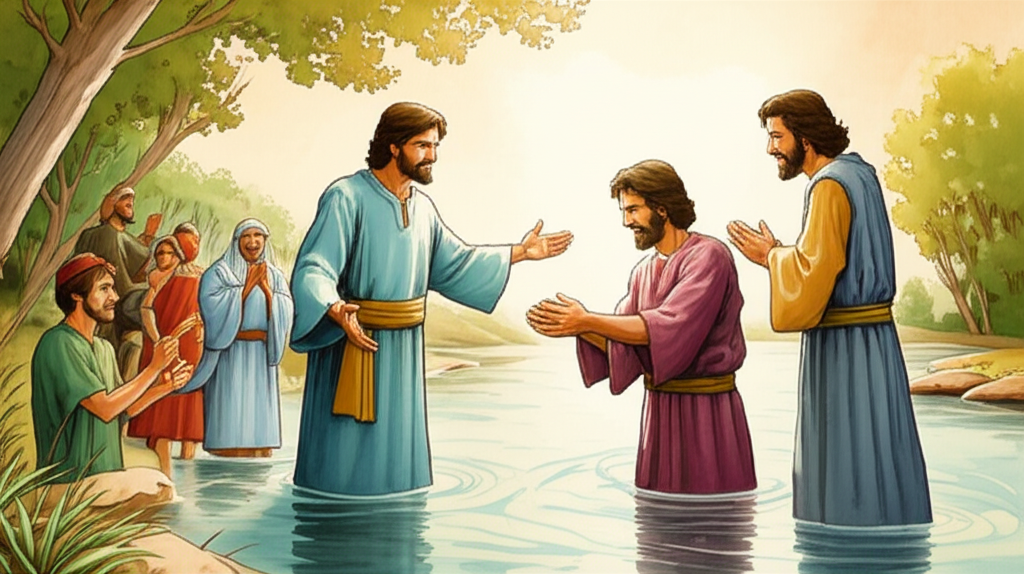
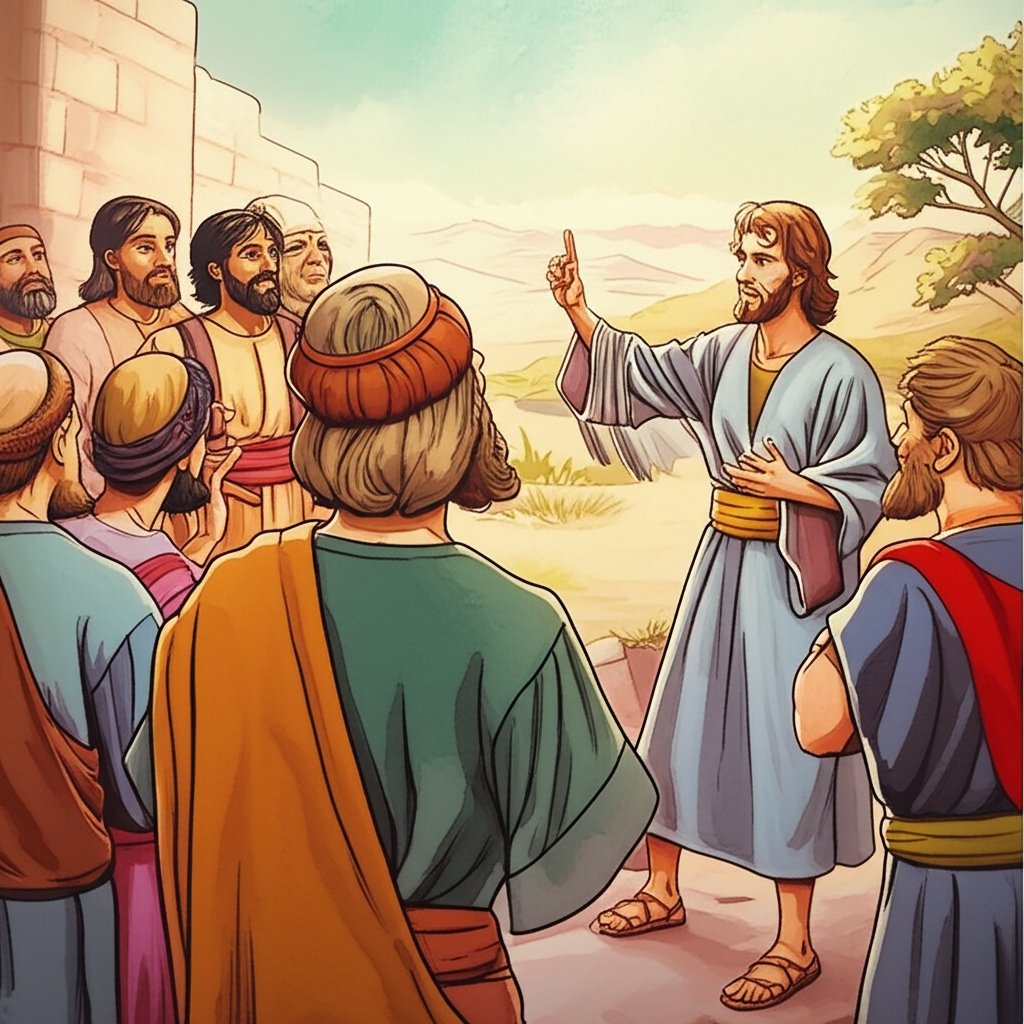
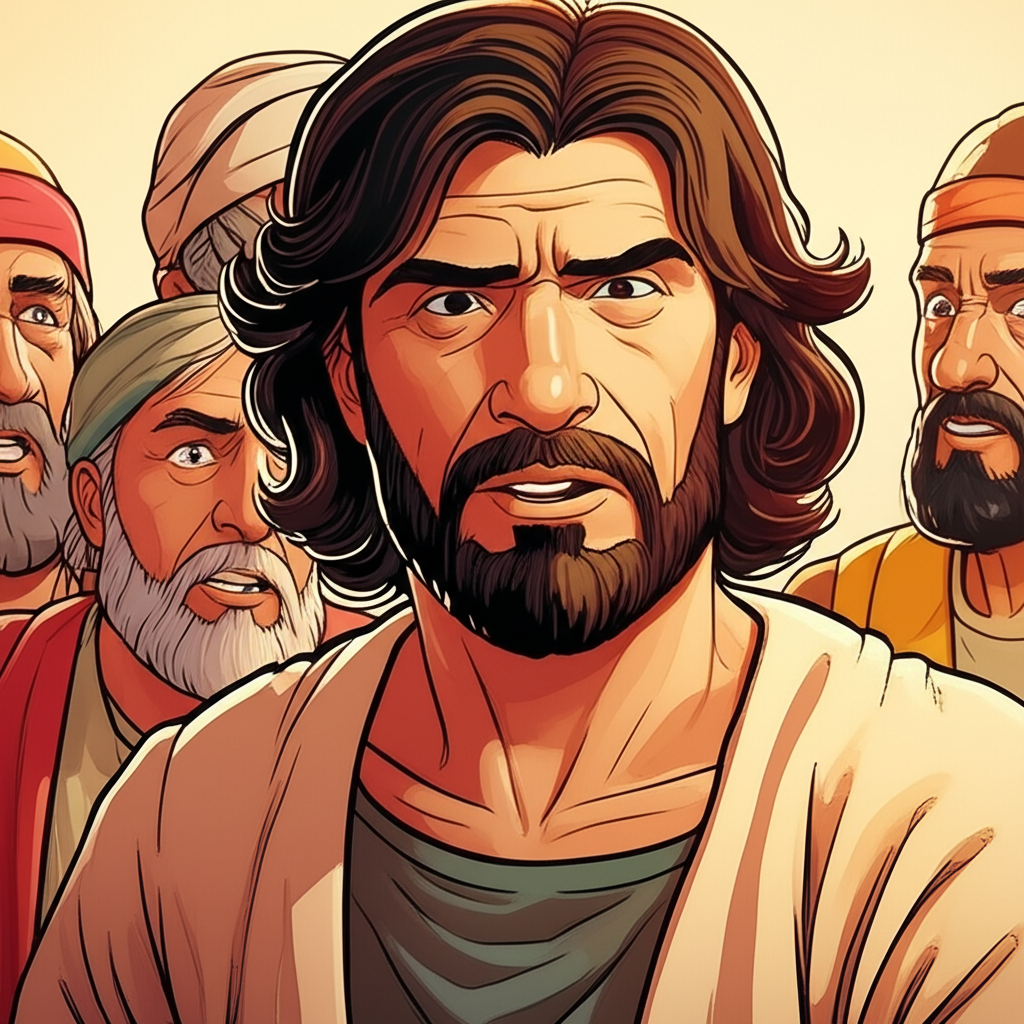
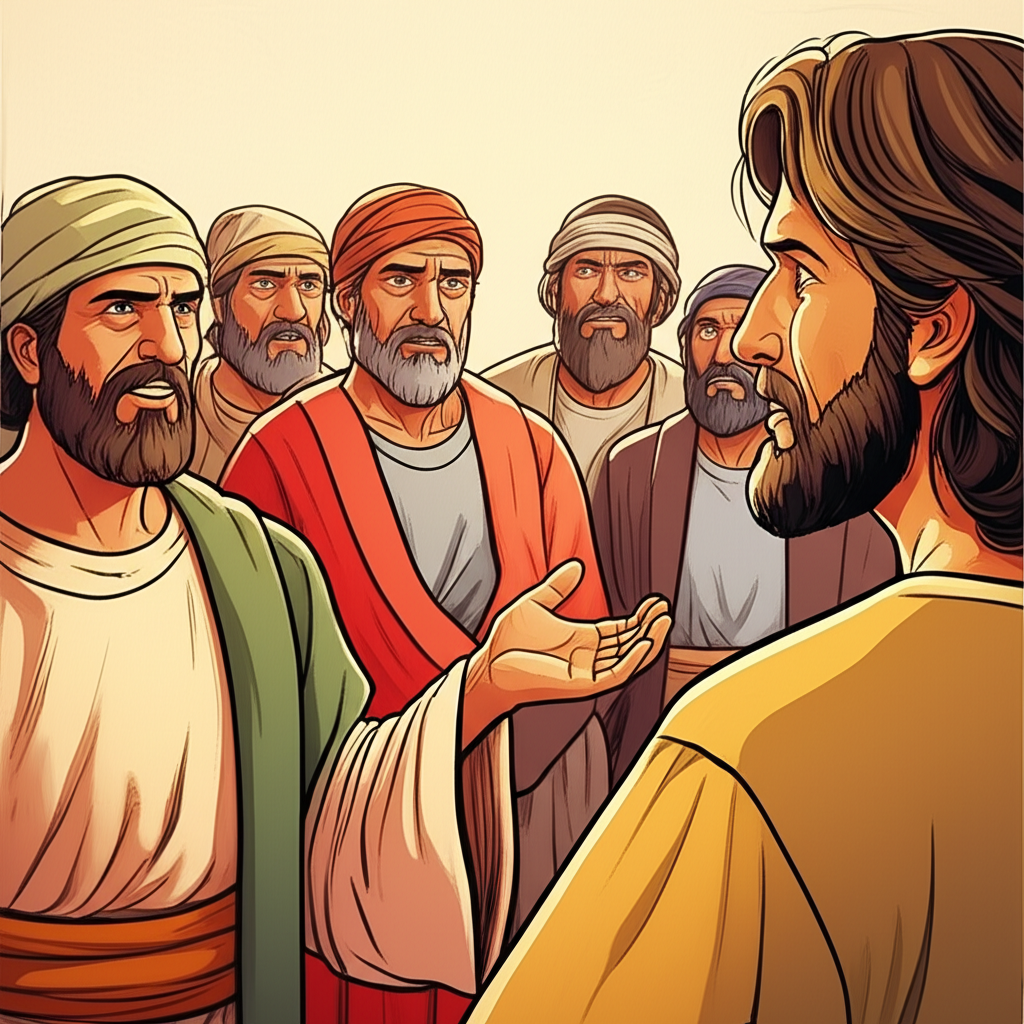
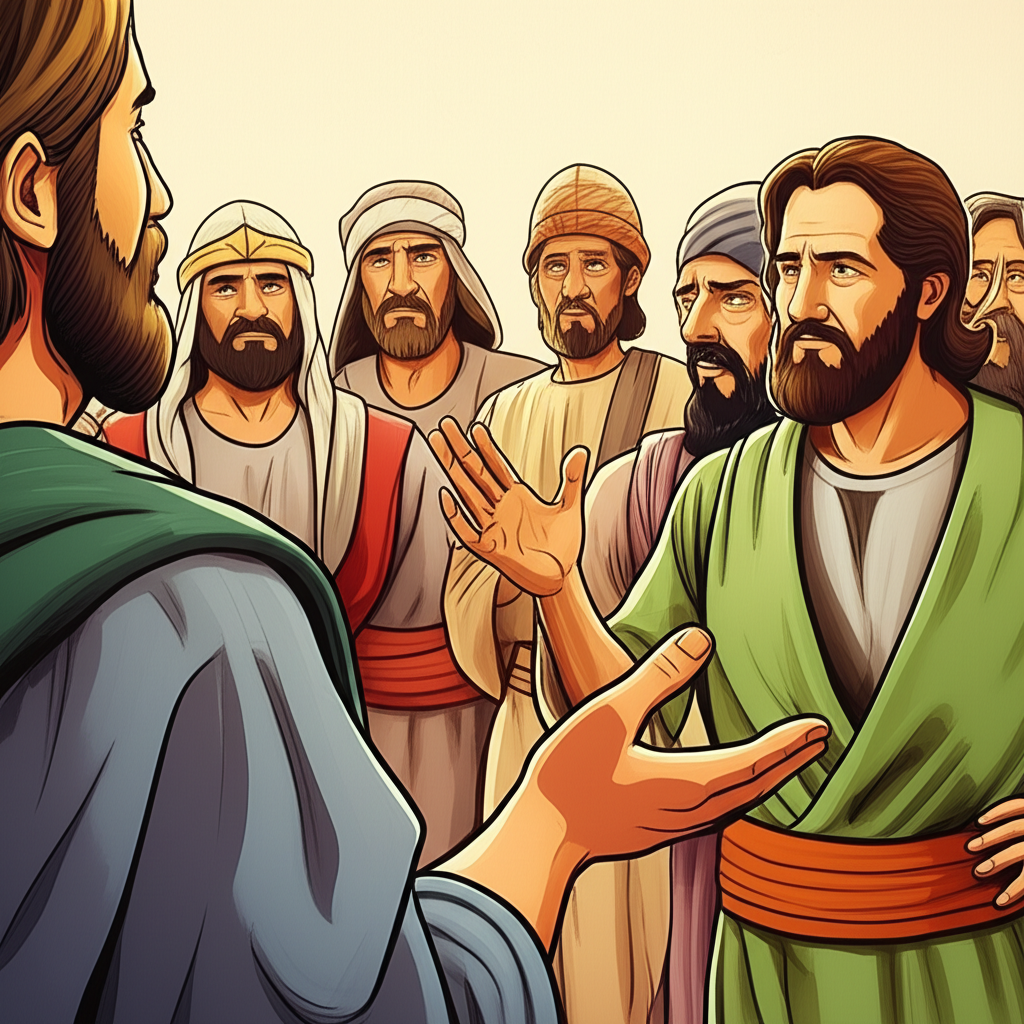
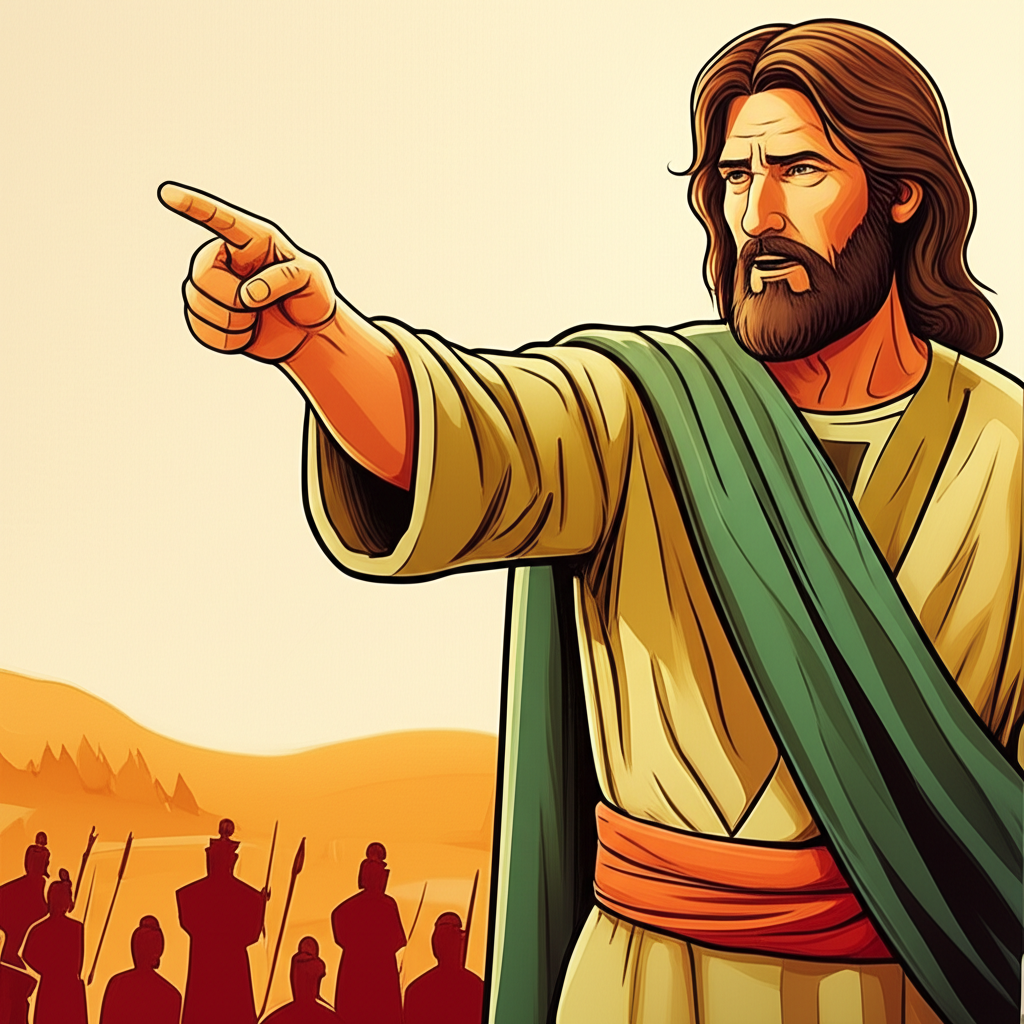
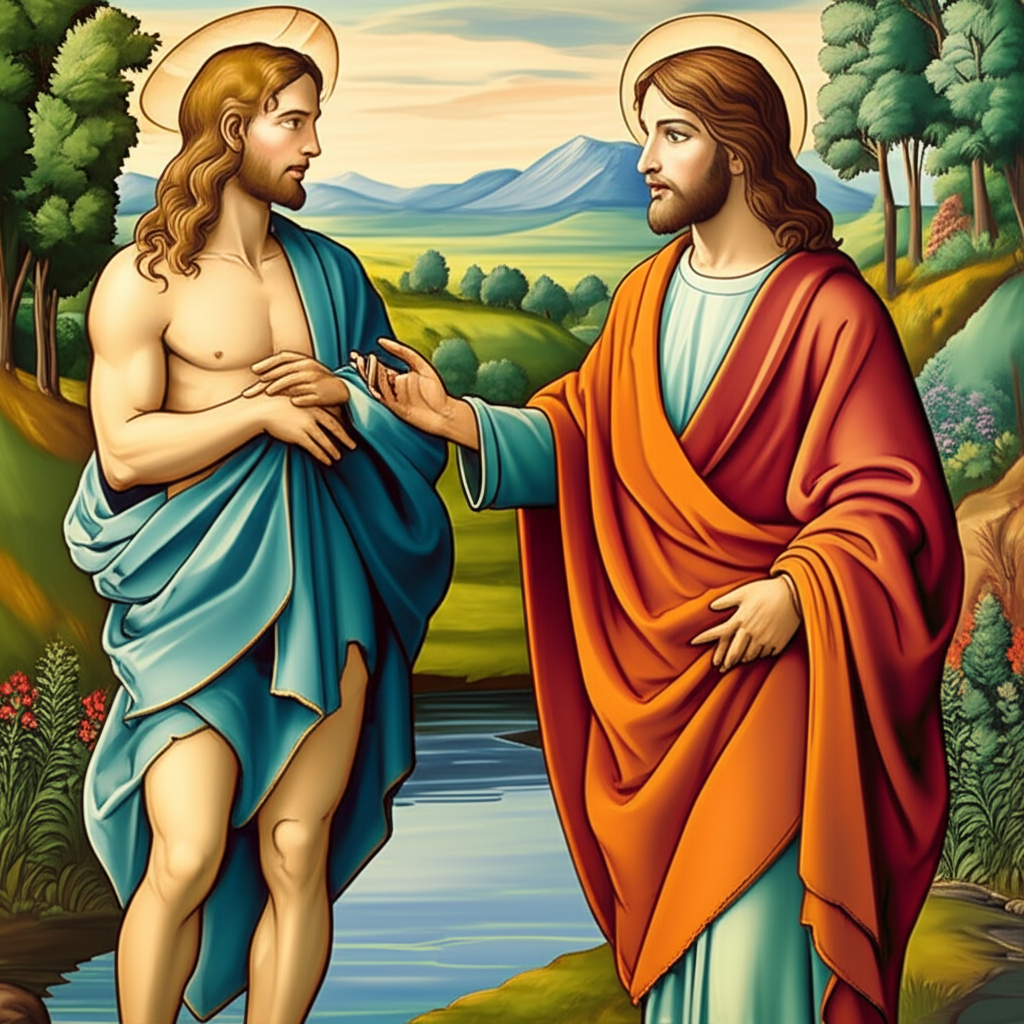

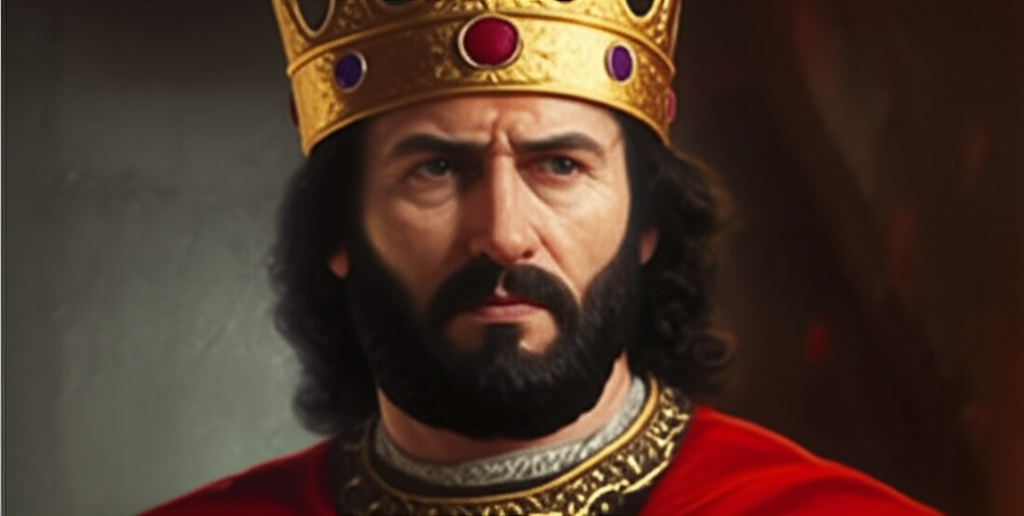
Luke chapter 3 kjv
- 1 Now in the fifteenth year of the reign of Tiberius Caesar, Pontius Pilate being governor of Judaea, and Herod being tetrarch of Galilee, and his brother Philip tetrarch of Ituraea and of the region of Trachonitis, and Lysanias the tetrarch of Abilene,
- 2 Annas and Caiaphas being the high priests, the word of God came unto John the son of Zacharias in the wilderness.
- 3 And he came into all the country about Jordan, preaching the baptism of repentance for the remission of sins;
- 4 As it is written in the book of the words of Esaias the prophet, saying, The voice of one crying in the wilderness, Prepare ye the way of the Lord, make his paths straight.
- 5 Every valley shall be filled, and every mountain and hill shall be brought low; and the crooked shall be made straight, and the rough ways shall be made smooth;
- 6 And all flesh shall see the salvation of God.
- 7 Then said he to the multitude that came forth to be baptized of him, O generation of vipers, who hath warned you to flee from the wrath to come?
- 8 Bring forth therefore fruits worthy of repentance, and begin not to say within yourselves, We have Abraham to our father: for I say unto you, That God is able of these stones to raise up children unto Abraham.
- 9 And now also the axe is laid unto the root of the trees: every tree therefore which bringeth not forth good fruit is hewn down, and cast into the fire.
- 10 And the people asked him, saying, What shall we do then?
- 11 He answereth and saith unto them, He that hath two coats, let him impart to him that hath none; and he that hath meat, let him do likewise.
- 12 Then came also publicans to be baptized, and said unto him, Master, what shall we do?
- 13 And he said unto them, Exact no more than that which is appointed you.
- 14 And the soldiers likewise demanded of him, saying, And what shall we do? And he said unto them, Do violence to no man, neither accuse any falsely; and be content with your wages.
- 15 And as the people were in expectation, and all men mused in their hearts of John, whether he were the Christ, or not;
- 16 John answered, saying unto them all, I indeed baptize you with water; but one mightier than I cometh, the latchet of whose shoes I am not worthy to unloose: he shall baptize you with the Holy Ghost and with fire:
- 17 Whose fan is in his hand, and he will throughly purge his floor, and will gather the wheat into his garner; but the chaff he will burn with fire unquenchable.
- 18 And many other things in his exhortation preached he unto the people.
- 19 But Herod the tetrarch, being reproved by him for Herodias his brother Philip's wife, and for all the evils which Herod had done,
- 20 Added yet this above all, that he shut up John in prison.
- 21 Now when all the people were baptized, it came to pass, that Jesus also being baptized, and praying, the heaven was opened,
- 22 And the Holy Ghost descended in a bodily shape like a dove upon him, and a voice came from heaven, which said, Thou art my beloved Son; in thee I am well pleased.
- 23 And Jesus himself began to be about thirty years of age, being (as was supposed) the son of Joseph, which was the son of Heli,
- 24 Which was the son of Matthat, which was the son of Levi, which was the son of Melchi, which was the son of Janna, which was the son of Joseph,
- 25 Which was the son of Mattathias, which was the son of Amos, which was the son of Naum, which was the son of Esli, which was the son of Nagge,
- 26 Which was the son of Maath, which was the son of Mattathias, which was the son of Semei, which was the son of Joseph, which was the son of Juda,
- 27 Which was the son of Joanna, which was the son of Rhesa, which was the son of Zorobabel, which was the son of Salathiel, which was the son of Neri,
- 28 Which was the son of Melchi, which was the son of Addi, which was the son of Cosam, which was the son of Elmodam, which was the son of Er,
- 29 Which was the son of Jose, which was the son of Eliezer, which was the son of Jorim, which was the son of Matthat, which was the son of Levi,
- 30 Which was the son of Simeon, which was the son of Juda, which was the son of Joseph, which was the son of Jonan, which was the son of Eliakim,
- 31 Which was the son of Melea, which was the son of Menan, which was the son of Mattatha, which was the son of Nathan, which was the son of David,
- 32 Which was the son of Jesse, which was the son of Obed, which was the son of Booz, which was the son of Salmon, which was the son of Naasson,
- 33 Which was the son of Aminadab, which was the son of Aram, which was the son of Esrom, which was the son of Phares, which was the son of Juda,
- 34 Which was the son of Jacob, which was the son of Isaac, which was the son of Abraham, which was the son of Thara, which was the son of Nachor,
- 35 Which was the son of Saruch, which was the son of Ragau, which was the son of Phalec, which was the son of Heber, which was the son of Sala,
- 36 Which was the son of Cainan, which was the son of Arphaxad, which was the son of Sem, which was the son of Noe, which was the son of Lamech,
- 37 Which was the son of Mathusala, which was the son of Enoch, which was the son of Jared, which was the son of Maleleel, which was the son of Cainan,
- 38 Which was the son of Enos, which was the son of Seth, which was the son of Adam, which was the son of God.
Luke chapter 3 nkjv
- 1 Now in the fifteenth year of the reign of Tiberius Caesar, Pontius Pilate being governor of Judea, Herod being tetrarch of Galilee, his brother Philip tetrarch of Iturea and the region of Trachonitis, and Lysanias tetrarch of Abilene,
- 2 while Annas and Caiaphas were high priests, the word of God came to John the son of Zacharias in the wilderness.
- 3 And he went into all the region around the Jordan, preaching a baptism of repentance for the remission of sins,
- 4 as it is written in the book of the words of Isaiah the prophet, saying: "The voice of one crying in the wilderness: 'Prepare the way of the LORD; Make His paths straight.
- 5 Every valley shall be filled And every mountain and hill brought low; The crooked places shall be made straight And the rough ways smooth;
- 6 And all flesh shall see the salvation of God.' "
- 7 Then he said to the multitudes that came out to be baptized by him, "Brood of vipers! Who warned you to flee from the wrath to come?
- 8 Therefore bear fruits worthy of repentance, and do not begin to say to yourselves, 'We have Abraham as our father.' For I say to you that God is able to raise up children to Abraham from these stones.
- 9 And even now the ax is laid to the root of the trees. Therefore every tree which does not bear good fruit is cut down and thrown into the fire."
- 10 So the people asked him, saying, "What shall we do then?"
- 11 He answered and said to them, "He who has two tunics, let him give to him who has none; and he who has food, let him do likewise."
- 12 Then tax collectors also came to be baptized, and said to him, "Teacher, what shall we do?"
- 13 And he said to them, "Collect no more than what is appointed for you."
- 14 Likewise the soldiers asked him, saying, "And what shall we do?" So he said to them, "Do not intimidate anyone or accuse falsely, and be content with your wages."
- 15 Now as the people were in expectation, and all reasoned in their hearts about John, whether he was the Christ or not,
- 16 John answered, saying to all, "I indeed baptize you with water; but One mightier than I is coming, whose sandal strap I am not worthy to loose. He will baptize you with the Holy Spirit and fire.
- 17 His winnowing fan is in His hand, and He will thoroughly clean out His threshing floor, and gather the wheat into His barn; but the chaff He will burn with unquenchable fire."
- 18 And with many other exhortations he preached to the people.
- 19 But Herod the tetrarch, being rebuked by him concerning Herodias, his brother Philip's wife, and for all the evils which Herod had done,
- 20 also added this, above all, that he shut John up in prison.
- 21 When all the people were baptized, it came to pass that Jesus also was baptized; and while He prayed, the heaven was opened.
- 22 And the Holy Spirit descended in bodily form like a dove upon Him, and a voice came from heaven which said, "You are My beloved Son; in You I am well pleased."
- 23 Now Jesus Himself began His ministry at about thirty years of age, being (as was supposed) the son of Joseph, the son of Heli,
- 24 the son of Matthat, the son of Levi, the son of Melchi, the son of Janna, the son of Joseph,
- 25 the son of Mattathiah, the son of Amos, the son of Nahum, the son of Esli, the son of Naggai,
- 26 the son of Maath, the son of Mattathiah, the son of Semei, the son of Joseph, the son of Judah,
- 27 the son of Joannas, the son of Rhesa, the son of Zerubbabel, the son of Shealtiel, the son of Neri,
- 28 the son of Melchi, the son of Addi, the son of Cosam, the son of Elmodam, the son of Er,
- 29 the son of Jose, the son of Eliezer, the son of Jorim, the son of Matthat, the son of Levi,
- 30 the son of Simeon, the son of Judah, the son of Joseph, the son of Jonan, the son of Eliakim,
- 31 the son of Melea, the son of Menan, the son of Mattathah, the son of Nathan, the son of David,
- 32 the son of Jesse, the son of Obed, the son of Boaz, the son of Salmon, the son of Nahshon,
- 33 the son of Amminadab, the son of Ram, the son of Hezron, the son of Perez, the son of Judah,
- 34 the son of Jacob, the son of Isaac, the son of Abraham, the son of Terah, the son of Nahor,
- 35 the son of Serug, the son of Reu, the son of Peleg, the son of Eber, the son of Shelah,
- 36 the son of Cainan, the son of Arphaxad, the son of Shem, the son of Noah, the son of Lamech,
- 37 the son of Methuselah, the son of Enoch, the son of Jared, the son of Mahalalel, the son of Cainan,
- 38 the son of Enosh, the son of Seth, the son of Adam, the son of God.
Luke chapter 3 niv
- 1 In the fifteenth year of the reign of Tiberius Caesar?when Pontius Pilate was governor of Judea, Herod tetrarch of Galilee, his brother Philip tetrarch of Iturea and Traconitis, and Lysanias tetrarch of Abilene?
- 2 during the high-priesthood of Annas and Caiaphas, the word of God came to John son of Zechariah in the wilderness.
- 3 He went into all the country around the Jordan, preaching a baptism of repentance for the forgiveness of sins.
- 4 As it is written in the book of the words of Isaiah the prophet: "A voice of one calling in the wilderness, 'Prepare the way for the Lord, make straight paths for him.
- 5 Every valley shall be filled in, every mountain and hill made low. The crooked roads shall become straight, the rough ways smooth.
- 6 And all people will see God's salvation.'?"
- 7 John said to the crowds coming out to be baptized by him, "You brood of vipers! Who warned you to flee from the coming wrath?
- 8 Produce fruit in keeping with repentance. And do not begin to say to yourselves, 'We have Abraham as our father.' For I tell you that out of these stones God can raise up children for Abraham.
- 9 The ax is already at the root of the trees, and every tree that does not produce good fruit will be cut down and thrown into the fire."
- 10 "What should we do then?" the crowd asked.
- 11 John answered, "Anyone who has two shirts should share with the one who has none, and anyone who has food should do the same."
- 12 Even tax collectors came to be baptized. "Teacher," they asked, "what should we do?"
- 13 "Don't collect any more than you are required to," he told them.
- 14 Then some soldiers asked him, "And what should we do?" He replied, "Don't extort money and don't accuse people falsely?be content with your pay."
- 15 The people were waiting expectantly and were all wondering in their hearts if John might possibly be the Messiah.
- 16 John answered them all, "I baptize you with water. But one who is more powerful than I will come, the straps of whose sandals I am not worthy to untie. He will baptize you with the Holy Spirit and fire.
- 17 His winnowing fork is in his hand to clear his threshing floor and to gather the wheat into his barn, but he will burn up the chaff with unquenchable fire."
- 18 And with many other words John exhorted the people and proclaimed the good news to them.
- 19 But when John rebuked Herod the tetrarch because of his marriage to Herodias, his brother's wife, and all the other evil things he had done,
- 20 Herod added this to them all: He locked John up in prison.
- 21 When all the people were being baptized, Jesus was baptized too. And as he was praying, heaven was opened
- 22 and the Holy Spirit descended on him in bodily form like a dove. And a voice came from heaven: "You are my Son, whom I love; with you I am well pleased."
- 23 Now Jesus himself was about thirty years old when he began his ministry. He was the son, so it was thought, of Joseph, the son of Heli,
- 24 the son of Matthat, the son of Levi, the son of Melki, the son of Jannai, the son of Joseph,
- 25 the son of Mattathias, the son of Amos, the son of Nahum, the son of Esli, the son of Naggai,
- 26 the son of Maath, the son of Mattathias, the son of Semein, the son of Josek, the son of Joda,
- 27 the son of Joanan, the son of Rhesa, the son of Zerubbabel, the son of Shealtiel, the son of Neri,
- 28 the son of Melki, the son of Addi, the son of Cosam, the son of Elmadam, the son of Er,
- 29 the son of Joshua, the son of Eliezer, the son of Jorim, the son of Matthat, the son of Levi,
- 30 the son of Simeon, the son of Judah, the son of Joseph, the son of Jonam, the son of Eliakim,
- 31 the son of Melea, the son of Menna, the son of Mattatha, the son of Nathan, the son of David,
- 32 the son of Jesse, the son of Obed, the son of Boaz, the son of Salmon, the son of Nahshon,
- 33 the son of Amminadab, the son of Ram, the son of Hezron, the son of Perez, the son of Judah,
- 34 the son of Jacob, the son of Isaac, the son of Abraham, the son of Terah, the son of Nahor,
- 35 the son of Serug, the son of Reu, the son of Peleg, the son of Eber, the son of Shelah,
- 36 the son of Cainan, the son of Arphaxad, the son of Shem, the son of Noah, the son of Lamech,
- 37 the son of Methuselah, the son of Enoch, the son of Jared, the son of Mahalalel, the son of Kenan,
- 38 the son of Enosh, the son of Seth, the son of Adam, the son of God.
Luke chapter 3 esv
- 1 In the fifteenth year of the reign of Tiberius Caesar, Pontius Pilate being governor of Judea, and Herod being tetrarch of Galilee, and his brother Philip tetrarch of the region of Ituraea and Trachonitis, and Lysanias tetrarch of Abilene,
- 2 during the high priesthood of Annas and Caiaphas, the word of God came to John the son of Zechariah in the wilderness.
- 3 And he went into all the region around the Jordan, proclaiming a baptism of repentance for the forgiveness of sins.
- 4 As it is written in the book of the words of Isaiah the prophet, "The voice of one crying in the wilderness: 'Prepare the way of the Lord, make his paths straight.
- 5 Every valley shall be filled, and every mountain and hill shall be made low, and the crooked shall become straight, and the rough places shall become level ways,
- 6 and all flesh shall see the salvation of God.'"
- 7 He said therefore to the crowds that came out to be baptized by him, "You brood of vipers! Who warned you to flee from the wrath to come?
- 8 Bear fruits in keeping with repentance. And do not begin to say to yourselves, 'We have Abraham as our father.' For I tell you, God is able from these stones to raise up children for Abraham.
- 9 Even now the axe is laid to the root of the trees. Every tree therefore that does not bear good fruit is cut down and thrown into the fire."
- 10 And the crowds asked him, "What then shall we do?"
- 11 And he answered them, "Whoever has two tunics is to share with him who has none, and whoever has food is to do likewise."
- 12 Tax collectors also came to be baptized and said to him, "Teacher, what shall we do?"
- 13 And he said to them, "Collect no more than you are authorized to do."
- 14 Soldiers also asked him, "And we, what shall we do?" And he said to them, "Do not extort money from anyone by threats or by false accusation, and be content with your wages."
- 15 As the people were in expectation, and all were questioning in their hearts concerning John, whether he might be the Christ,
- 16 John answered them all, saying, "I baptize you with water, but he who is mightier than I is coming, the strap of whose sandals I am not worthy to untie. He will baptize you with the Holy Spirit and fire.
- 17 His winnowing fork is in his hand, to clear his threshing floor and to gather the wheat into his barn, but the chaff he will burn with unquenchable fire."
- 18 So with many other exhortations he preached good news to the people.
- 19 But Herod the tetrarch, who had been reproved by him for Herodias, his brother's wife, and for all the evil things that Herod had done,
- 20 added this to them all, that he locked up John in prison.
- 21 Now when all the people were baptized, and when Jesus also had been baptized and was praying, the heavens were opened,
- 22 and the Holy Spirit descended on him in bodily form, like a dove; and a voice came from heaven, "You are my beloved Son; with you I am well pleased."
- 23 Jesus, when he began his ministry, was about thirty years of age, being the son (as was supposed) of Joseph, the son of Heli,
- 24 the son of Matthat, the son of Levi, the son of Melchi, the son of Jannai, the son of Joseph,
- 25 the son of Mattathias, the son of Amos, the son of Nahum, the son of Esli, the son of Naggai,
- 26 the son of Maath, the son of Mattathias, the son of Semein, the son of Josech, the son of Joda,
- 27 the son of Joanan, the son of Rhesa, the son of Zerubbabel, the son of Shealtiel, the son of Neri,
- 28 the son of Melchi, the son of Addi, the son of Cosam, the son of Elmadam, the son of Er,
- 29 the son of Joshua, the son of Eliezer, the son of Jorim, the son of Matthat, the son of Levi,
- 30 the son of Simeon, the son of Judah, the son of Joseph, the son of Jonam, the son of Eliakim,
- 31 the son of Melea, the son of Menna, the son of Mattatha, the son of Nathan, the son of David,
- 32 the son of Jesse, the son of Obed, the son of Boaz, the son of Sala, the son of Nahshon,
- 33 the son of Amminadab, the son of Admin, the son of Arni, the son of Hezron, the son of Perez, the son of Judah,
- 34 the son of Jacob, the son of Isaac, the son of Abraham, the son of Terah, the son of Nahor,
- 35 the son of Serug, the son of Reu, the son of Peleg, the son of Eber, the son of Shelah,
- 36 the son of Cainan, the son of Arphaxad, the son of Shem, the son of Noah, the son of Lamech,
- 37 the son of Methuselah, the son of Enoch, the son of Jared, the son of Mahalaleel, the son of Cainan,
- 38 the son of Enos, the son of Seth, the son of Adam, the son of God.
Luke chapter 3 nlt
- 1 It was now the fifteenth year of the reign of Tiberius, the Roman emperor. Pontius Pilate was governor over Judea; Herod Antipas was ruler over Galilee; his brother Philip was ruler over Iturea and Traconitis; Lysanias was ruler over Abilene.
- 2 Annas and Caiaphas were the high priests. At this time a message from God came to John son of Zechariah, who was living in the wilderness.
- 3 Then John went from place to place on both sides of the Jordan River, preaching that people should be baptized to show that they had repented of their sins and turned to God to be forgiven.
- 4 Isaiah had spoken of John when he said, "He is a voice shouting in the wilderness,
'Prepare the way for the LORD's coming!
Clear the road for him! - 5 The valleys will be filled,
and the mountains and hills made level.
The curves will be straightened,
and the rough places made smooth. - 6 And then all people will see
the salvation sent from God.'" - 7 When the crowds came to John for baptism, he said, "You brood of snakes! Who warned you to flee the coming wrath?
- 8 Prove by the way you live that you have repented of your sins and turned to God. Don't just say to each other, 'We're safe, for we are descendants of Abraham.' That means nothing, for I tell you, God can create children of Abraham from these very stones.
- 9 Even now the ax of God's judgment is poised, ready to sever the roots of the trees. Yes, every tree that does not produce good fruit will be chopped down and thrown into the fire."
- 10 The crowds asked, "What should we do?"
- 11 John replied, "If you have two shirts, give one to the poor. If you have food, share it with those who are hungry."
- 12 Even corrupt tax collectors came to be baptized and asked, "Teacher, what should we do?"
- 13 He replied, "Collect no more taxes than the government requires."
- 14 "What should we do?" asked some soldiers. John replied, "Don't extort money or make false accusations. And be content with your pay."
- 15 Everyone was expecting the Messiah to come soon, and they were eager to know whether John might be the Messiah.
- 16 John answered their questions by saying, "I baptize you with water; but someone is coming soon who is greater than I am ? so much greater that I'm not even worthy to be his slave and untie the straps of his sandals. He will baptize you with the Holy Spirit and with fire.
- 17 He is ready to separate the chaff from the wheat with his winnowing fork. Then he will clean up the threshing area, gathering the wheat into his barn but burning the chaff with never-ending fire."
- 18 John used many such warnings as he announced the Good News to the people.
- 19 John also publicly criticized Herod Antipas, the ruler of Galilee, for marrying Herodias, his brother's wife, and for many other wrongs he had done.
- 20 So Herod put John in prison, adding this sin to his many others.
- 21 One day when the crowds were being baptized, Jesus himself was baptized. As he was praying, the heavens opened,
- 22 and the Holy Spirit, in bodily form, descended on him like a dove. And a voice from heaven said, "You are my dearly loved Son, and you bring me great joy. "
- 23 Jesus was about thirty years old when he began his public ministry. Jesus was known as the son of Joseph.
Joseph was the son of Heli. - 24 Heli was the son of Matthat.
Matthat was the son of Levi.
Levi was the son of Melki.
Melki was the son of Jannai.
Jannai was the son of Joseph. - 25 Joseph was the son of Mattathias.
Mattathias was the son of Amos.
Amos was the son of Nahum.
Nahum was the son of Esli.
Esli was the son of Naggai. - 26 Naggai was the son of Maath.
Maath was the son of Mattathias.
Mattathias was the son of Semein.
Semein was the son of Josech.
Josech was the son of Joda. - 27 Joda was the son of Joanan.
Joanan was the son of Rhesa.
Rhesa was the son of Zerubbabel.
Zerubbabel was the son of Shealtiel.
Shealtiel was the son of Neri. - 28 Neri was the son of Melki.
Melki was the son of Addi.
Addi was the son of Cosam.
Cosam was the son of Elmadam.
Elmadam was the son of Er. - 29 Er was the son of Joshua.
Joshua was the son of Eliezer.
Eliezer was the son of Jorim.
Jorim was the son of Matthat.
Matthat was the son of Levi. - 30 Levi was the son of Simeon.
Simeon was the son of Judah.
Judah was the son of Joseph.
Joseph was the son of Jonam.
Jonam was the son of Eliakim. - 31 Eliakim was the son of Melea.
Melea was the son of Menna.
Menna was the son of Mattatha.
Mattatha was the son of Nathan.
Nathan was the son of David. - 32 David was the son of Jesse.
Jesse was the son of Obed.
Obed was the son of Boaz.
Boaz was the son of Salmon.
Salmon was the son of Nahshon. - 33 Nahshon was the son of Amminadab.
Amminadab was the son of Admin.
Admin was the son of Arni.
Arni was the son of Hezron.
Hezron was the son of Perez.
Perez was the son of Judah. - 34 Judah was the son of Jacob.
Jacob was the son of Isaac.
Isaac was the son of Abraham.
Abraham was the son of Terah.
Terah was the son of Nahor. - 35 Nahor was the son of Serug.
Serug was the son of Reu.
Reu was the son of Peleg.
Peleg was the son of Eber.
Eber was the son of Shelah. - 36 Shelah was the son of Cainan.
Cainan was the son of Arphaxad.
Arphaxad was the son of Shem.
Shem was the son of Noah.
Noah was the son of Lamech. - 37 Lamech was the son of Methuselah.
Methuselah was the son of Enoch.
Enoch was the son of Jared.
Jared was the son of Mahalalel.
Mahalalel was the son of Kenan. - 38 Kenan was the son of Enosh.
Enosh was the son of Seth.
Seth was the son of Adam.
Adam was the son of God.
- Bible Book of Luke
- 1 Story of Zacharias and Elisabeth
- 2 Mary giving birth to Jesus
- 3 John the Baptist Prepares the Way
- 4 The Temptation of Jesus
- 5 Jesus Calls the First Disciples
- 6 Jesus about the Sabbath
- 7 Jesus Heals a Centurion's Servant
- 8 Women Accompanying Jesus
- 9 Jesus Sends Out the Twelve Apostles
- 10 Jesus Sends Out the Seventy-Two
- 11 The Lord's Prayer
- 12 Beware of the Leaven of the Pharisees
- 13 Repent or Perish
- 14 Healing of a Man on the Sabbath
- 15 Parable of the Lost Sheep
- 16 Parable of the Shrewd Manager
- 17 Jesus teaching on Forgiveness
- 18 The Parable of the Persistent Widow
- 19 Zacchaeus the Tax Collector
- 20 The Authority of Jesus Challenged
- 21 The Widow's Offering
- 22 Judas the one who betrayed Jesus
- 23 The Crucifixion of Jesus
- 24 Jesus is Risen